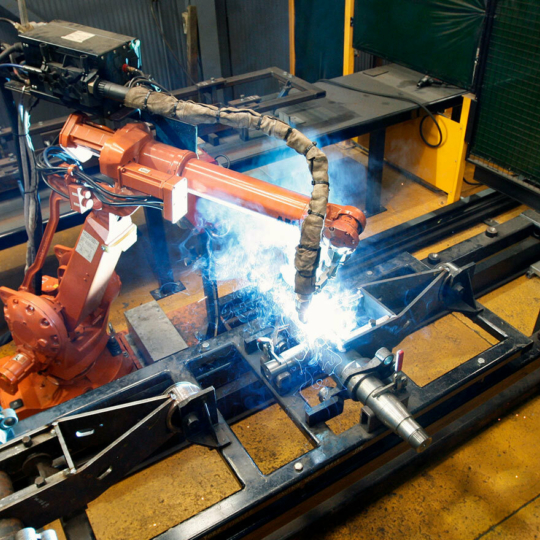Select your region / language
Robotic Welding Solution Achieves 64% Reduction in Cycle Time

Investing in an automated system to overhaul manual techniques resulted in a vast improvement in production time for heavy-duty trailers specialist, Drake Trailers resulted in a massive 64% reduction in cycle time.
Australian-owned Drake Trailers, specializes in the design and manufacturer of low loaders, mine site transporters and steerable platform trailers, as well as a range of other equipment used in the heavy haulage industry. As Australia’s leading manufacturer of specialized heavy-duty trailers, they needed total reliability of any automation integrated at their facility as any problems or faults with the production machinery can have a significant impact on output and profitability.
Drake Trailers approached Scott with goals to increase productivity and output in Australia while at the same time minimizing costs. At the time, they were manually welding components varying in size and laborers were required to manually rotate heavy components during assembly. In order to comply with safety regulations, staff numbers were increased to manage the workload. While this increase in staff minimized the cycle time it was not cost-effective.
For Drake Trailers consistency is paramount because it guarantees product reliability. As their General Manager Khali Lake explains,
“Our trailers are used in some of the most remote parts of the country across a wide range of industries. Our customers need a product that doesn’t require regular unscheduled maintenance or repairs.”
Manual welding requires a high level of skill as well as concentration to achieve consistency, and they found that the manual process introduced inconsistencies in the product.
“As our components lacked uniformity for fitment and machining, the finished quality was not perfect. Our production times were increasing and we lacked human resources to keep manufacturing times under control. We needed to find a solution to increase accuracy so we wouldn’t lose our competitive edge. We wanted a new system which would allow us to improve production turnaround times and reduce setup times” - Drake Trailers CEO Greg Alison
Scott designed and installed a robotic welding system capable of handling a wide range of components. The design consisted of a welding robot on a linear track covering three stations. One station includes a single-axis rotating positioner that can hold up to 2000kg of product to be welded, while separated by a partition, the second station contains a multi-axis positioner that can hold up to 750kg. The third station includes a long table opposite the previously mentioned stations and is utilized when longer components need to be welded.
The design of the stations was to allow for continuous work as components could be loaded in one station whilst the robot would weld components in the other. In the event of longer components to be welded, the partition would be opened in order for the long table to be utilized. The Scott system also allowed the cell to run in a fully automated mode or if needed a manual input via the Manual Jog Station could be utilized. This allowed for seamless processing and flexibility as components can be manually repositioned once loaded onto a positioner.
Upon installation and commissioning, Drake Trailers experienced significant improvements in production.
“With the new system we have been able to save a lot of money and it has allowed us to remain an Australian company trading in Australia. Using a robotic welder ensures consistency across the trailer manufacturing process, which in turn provides the most reliable product possible. We know each weld will perform to the standards it was designed for which gives our customers a trailer they can rely on” - General Manager Khali Lake.
The Scott automated robotic welding system reduced manufacturing time by 40-60% (depending on the component), and machining time reduced by 15-20%. The system allows the operator to work efficiently and accurately without interruption, which maximizes robot utilization. Previously Drake Trailers had 3 or 4 welding bays running 2 shifts per day, but after installing the robotic system one operator can now work within the three station cell.
Integrating a robotic welding system exceeded expectations for Drake Trailers and they are considering additional installations. In the years since Drake Trailers purchased their first robotic welder, the market for robotic welders has grown faster than any other industrial robot with the global robotic welding market projected to grow to $5.96 billion USD by 2023.
Learn More About Robotic Welding
Robotic welding and metal fabrication involve highly complex and sophisticated technology. With several decades of robotic and automation experience, Scott has the experience to offer a cutting edge easy-to-operate turn-key solution for metal fabrication.










